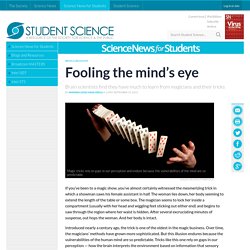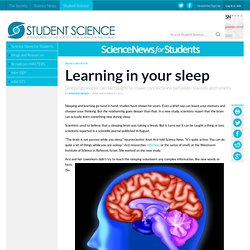

Science News Headlines. Science News, Articles and Information. Science. HowStuffWorks "Learn how Everything Works!". Discovery Channel : Science, History, Space, Tech, Sharks, News! Science News, Articles and Information. Science News for Kids. Sniffing for bad air. The air quality in many classrooms is unhealthy, due to poor ventilation.

But simple solutions such as opening a window can help get rid of bad air. i_love_zou_york/iStockphoto Chemist Jack Driscoll holds a new device he helped design that measures concentrations of carbon dioxide. The sensor can be used by school maintenance personnel to identify poor classroom ventilation. PID Analyzers, LLC In the past few weeks, millions of students, teachers and staff have returned to classrooms in schools across the United States. The handheld device developed by a chemist and his colleagues is easy to use: Simply carry it into a room where you want to measure carbon dioxide levels. With every breath you take, you inhale a host of gases, including oxygen. Nitrogen makes up more than 78 percent of the air; oxygen almost 21 percent.
Odorless and colorless, CO2 comes from many sources. When levels of CO2 build up, people may develop headaches or become sleepy, notes Roger Hedrick. Power Words. Fooling the mind’s eye. Magic tricks rely on gaps in our perception and endure because the vulnerabilities of the mind are so predictable.

Suslik1983/shutterstock If you’ve been to a magic show, you’ve almost certainly witnessed the mesmerizing trick in which a showman saws his female assistant in half. The woman lies down, her body seeming to extend the length of the table or some box. The magician seems to lock her inside a compartment (usually with her head and wiggling feet sticking out either end) and begins to saw through the region where her waist is hidden. After several excruciating minutes of suspense, out hops the woman. Introduced nearly a century ago, the trick is one of the oldest in the magic business. Scientists who study the brain have been tapping into the world of magic to learn how its tricks fool our minds.
Neuroscientists and psychologists study how the mind works and how emotions can affect our responses. Barrow Neurological Institute Coping with too much information Dimitri Sherman. Learning in your sleep. Your brain is so eager to learn that it does so even while you sleep, scientists recently found.

National Institute of General Medical Sciences Sleeping and learning go hand in hand, studies have shown for years. Even a brief nap can boost your memory and sharpen your thinking. But the relationship goes deeper than that. In a new study, scientists report that the brain can actually learn something new during sleep. Scientists used to believe that a sleeping brain was taking a break. “The brain is not passive while you sleep,” neuroscientist Anat Arzi told Science News. Arzi and her coworkers didn’t try to teach the sleeping volunteers any complex information, like new words or facts. Science News. Scienceforkids.org. Ask an Expert: Answers to Your Science Questions. Science Fair Project Ideas, Answers, & Tools. National Geographic - Inspiring People to Care About the Planet Since 1888.